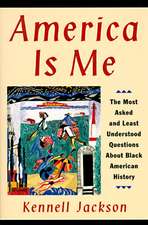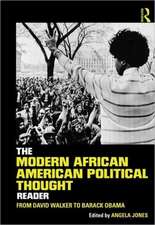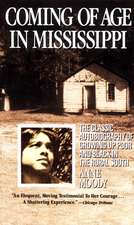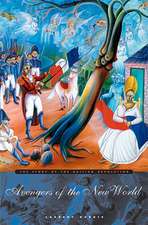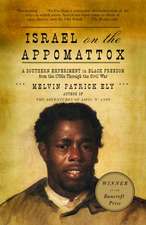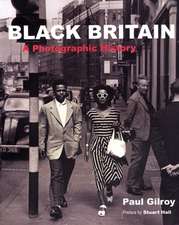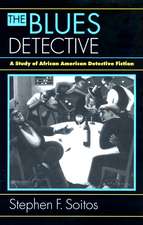Origins of the Black Atlantic: Rewriting Histories
Editat de Laurent Dubois, Julius S. Scotten Limba Engleză Hardback – 14 sep 2009
Until relatively recently, comparatively little attention was paid to the perspectives, daily experiences, hopes, and especially the political ideas of the enslaved who played such a central role in the making of the Atlantic world. Over the past decades, however, huge strides have been made in the study of the history of slavery and emancipation in the Atlantic world. This collection brings together some of the key contributions to this growing body of scholarship, showing a range of methodological approaches, that can be used to understand and reconstruct the lives of these enslaved people.
| Toate formatele și edițiile | Preț | Express |
|---|---|---|
| Paperback (1) | 430.09 lei 6-8 săpt. | |
| Taylor & Francis – 14 sep 2009 | 430.09 lei 6-8 săpt. | |
| Hardback (1) | 1012.10 lei 6-8 săpt. | |
| Taylor & Francis – 14 sep 2009 | 1012.10 lei 6-8 săpt. |
Din seria Rewriting Histories
-
 Preț: 372.58 lei
Preț: 372.58 lei -
 Preț: 385.54 lei
Preț: 385.54 lei -
 Preț: 500.84 lei
Preț: 500.84 lei -
 Preț: 450.40 lei
Preț: 450.40 lei -
 Preț: 380.74 lei
Preț: 380.74 lei - 26%
 Preț: 356.43 lei
Preț: 356.43 lei -
 Preț: 467.78 lei
Preț: 467.78 lei - 20%
 Preț: 264.59 lei
Preț: 264.59 lei -
 Preț: 387.49 lei
Preț: 387.49 lei -
 Preț: 255.42 lei
Preț: 255.42 lei -
 Preț: 356.44 lei
Preț: 356.44 lei -
 Preț: 454.22 lei
Preț: 454.22 lei -
 Preț: 430.09 lei
Preț: 430.09 lei -
 Preț: 398.31 lei
Preț: 398.31 lei - 18%
 Preț: 1000.27 lei
Preț: 1000.27 lei - 18%
 Preț: 1225.53 lei
Preț: 1225.53 lei -
 Preț: 365.32 lei
Preț: 365.32 lei - 20%
 Preț: 260.16 lei
Preț: 260.16 lei - 16%
 Preț: 239.51 lei
Preț: 239.51 lei -
 Preț: 378.22 lei
Preț: 378.22 lei -
 Preț: 395.43 lei
Preț: 395.43 lei -
 Preț: 392.93 lei
Preț: 392.93 lei -
 Preț: 440.95 lei
Preț: 440.95 lei -
 Preț: 398.86 lei
Preț: 398.86 lei -
 Preț: 367.66 lei
Preț: 367.66 lei -
 Preț: 243.04 lei
Preț: 243.04 lei - 18%
 Preț: 1114.58 lei
Preț: 1114.58 lei - 25%
 Preț: 738.81 lei
Preț: 738.81 lei - 16%
 Preț: 263.36 lei
Preț: 263.36 lei
Preț: 1012.10 lei
Preț vechi: 1234.26 lei
-18% Nou
Puncte Express: 1518
Preț estimativ în valută:
193.69€ • 201.47$ • 159.90£
193.69€ • 201.47$ • 159.90£
Carte tipărită la comandă
Livrare economică 14-28 aprilie
Preluare comenzi: 021 569.72.76
Specificații
ISBN-13: 9780415994453
ISBN-10: 0415994454
Pagini: 420
Ilustrații: 10 halftones and Following The Old South/The New South
Dimensiuni: 156 x 234 mm
Greutate: 0.79 kg
Ediția:New.
Editura: Taylor & Francis
Colecția Routledge
Seria Rewriting Histories
Locul publicării:Oxford, United Kingdom
ISBN-10: 0415994454
Pagini: 420
Ilustrații: 10 halftones and Following The Old South/The New South
Dimensiuni: 156 x 234 mm
Greutate: 0.79 kg
Ediția:New.
Editura: Taylor & Francis
Colecția Routledge
Seria Rewriting Histories
Locul publicării:Oxford, United Kingdom
Recenzii
'This excellent set of essays gathered and introduced by Laurent Dubois and Julius Scott will become a classic of its kind -- useful to scholars, teachers, and readers of history as long as we want to understand the world of race and class we live in.'
— Marcus Rediker, author of The Slave Ship: A Human History
'Any course on Atlantic revolutions would benefit from this anthology. It provides an important counter-weight to more Euro-centric accounts of the Age of Revolution by showing how enslaved people understood and re-imagined their role within the societies that had enslaved them.'
— John D. Garrigus, author of Before Haiti: Race and Citizenship in French Saint-Domingue
'Laurent Dubois and Julius Scott have put together an up-to-date collection of the most interesting literature on the formation of the Black Atlantic, which could easily form the core of a course on the subject. They have been particularly careful to find literature that reveals the dynamic nature of Afro-Atlantic culture and its engagement with the political and cultural dimensions of the Americas.'
— John Thornton
'An extraordinarily rich and skilfully assembled collection, and well suited to classroom use, this represents a valuable contribution to an increasingly sophisticated field.' – Journal of American Studies
— Marcus Rediker, author of The Slave Ship: A Human History
'Any course on Atlantic revolutions would benefit from this anthology. It provides an important counter-weight to more Euro-centric accounts of the Age of Revolution by showing how enslaved people understood and re-imagined their role within the societies that had enslaved them.'
— John D. Garrigus, author of Before Haiti: Race and Citizenship in French Saint-Domingue
'Laurent Dubois and Julius Scott have put together an up-to-date collection of the most interesting literature on the formation of the Black Atlantic, which could easily form the core of a course on the subject. They have been particularly careful to find literature that reveals the dynamic nature of Afro-Atlantic culture and its engagement with the political and cultural dimensions of the Americas.'
— John Thornton
'An extraordinarily rich and skilfully assembled collection, and well suited to classroom use, this represents a valuable contribution to an increasingly sophisticated field.' – Journal of American Studies
Cuprins
Contents, Series Editor’s Preface, Preface, Introduction, Part I: People and Ideas in Circulation , David Barry Gaspar, ’A Dangerous Spirit of Liberty’: Slave Rebellion in the West Indies in the 1730s , Richard Sheridan, The Jamaican Slave Insurrection Scare of 1776 and the American Revolution, , Neville A.T. Hall, Maritime Maroons: Grand Marronage from the Danish West Indies, , Julius Scott, The Common Wind: Currents of Afro-American Communication in the Era of the Haitian Revolution , Part II: Atlantic Generations, Richard Gray, The Papacy and the Atlantic Slave Trade: Lourenço da Silva, The Capuchins, and the Decisions of the Holy Office, , Ira Berlin, From Creole to African: Atlantic Creoles and the Origins of African-American Society in Mainland North America, , Emily Clark and Virginia Meacham Gould, The Feminine Face of Afro-Catholicism in New Orleans, 1727-1852, , Part III: Africa in the Americas, John Thornton, African Soldiers in the Haitian Revolution, , João Reis, Slave Rebellion in Brazil: The Muslim Uprising of 1835 in Bahia, selections. , Kenneth Bilby, Swearing by the Past, Swearing to the Future: Sacred Oaths, Alliances, and Treaties Among the Guianese and Jamaican Maroons, , Part IV: Insurrection and Emancipation in the Atlantic , Matthew Childs, The 1812 Aponte Rebellion and the Struggle Against Slavery in Cuba , Eric Williams, The Slaves and Slavery, , Steven Hahn, ‘Extravagant Expectations’ of Freedom: Rumour, Political Struggle, and the Christmas Insurrection Scare of 1865 in the American South, Rebecca Scott, Reclaiming Gregoria’s Mule: The Meanings of Freedom in the Arimao and Caunao Valleys, Cienfuegos, Cuba, 1880-1889, , Permission Acknowledgements, Index
Descriere
Until relatively recently, comparatively little attention was paid to the perspectives, daily experiences, hopes, and especially the political ideas of the enslaved who played such a central role in the making of the Atlantic world. Over the past decades, however, huge strides have been made in the study of the history of slavery and emancipation in the Atlantic world. Origins of the Black Atlantic collects some of the key contributions to this growing body of scholarship, showing a range of methodological approaches, that can be used to understand and reconstruct the lives of these enslaved people.

